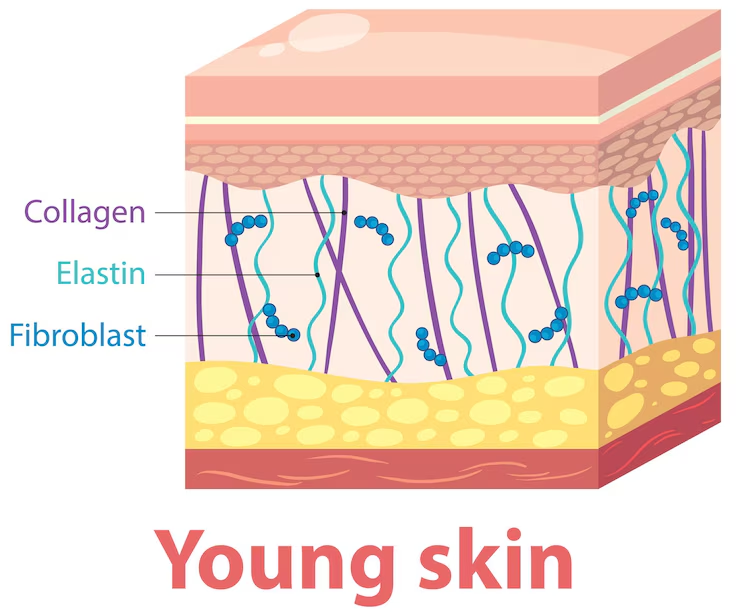Collagen has taken the beauty and health industry by storm, with countless supplements, creams, and treatments promising youthful skin, stronger joints, and healthier hair. But what exactly is collagen, and how should you use it effectively? In this comprehensive guide, we’ll dive deep into what collagen is, why it’s important, how different percentages impact effectiveness, and the best ways to incorporate it into your routine. Whether you’re considering collagen for skincare, overall health, or aging concerns, this article will provide everything you need to know.
What is Collagen?
Collagen is the most abundant protein in the human body, making up about 30% of total protein content. It is the primary structural component of skin, bones, tendons, ligaments, and cartilage, acting as the “glue” that holds everything together. As we age, collagen production naturally declines, leading to wrinkles, joint pain, and weaker hair and nails.
Types of Collagen and Their Functions
There are 28 different types of collagen, but the three most common types are:
- Type I: Found in skin, bones, tendons, and ligaments (makes up 90% of body collagen).
- Type II: Primarily in cartilage, essential for joint health.
- Type III: Found in skin, muscles, and blood vessels, supporting elasticity and wound healing.
Collagen is commonly sourced from bovine (cow), marine (fish), chicken, or eggshell membranes and is available in different forms, including powders, capsules, and skincare products.
Key Considerations Before Using Collagen
Before adding collagen to your diet or skincare routine, it’s crucial to understand the factors that affect its effectiveness.
1. Types of Collagen Supplements
Collagen comes in different formulations, and choosing the right one depends on your goals:
| Type | Best For | Key Benefits |
|---|---|---|
| Hydrolyzed Collagen (Collagen Peptides) | General health, skin, hair, and nails | Easily absorbed and highly bioavailable |
| Gelatin (Partially Hydrolyzed) | Gut health, cooking | Forms gels, supports digestion |
| Marine Collagen | Anti-aging, skin health | Rich in Type I collagen, easily absorbed |
| Undenatured Collagen | Joint and cartilage health | Best for arthritis and joint pain |
2. Strength and Percentage Differences
Collagen supplements come in varying strengths, typically measured in grams per serving:
| Collagen Dosage (Per Serving) | Best For | Effects |
|---|---|---|
| 2-5g | Maintenance, skin hydration | Mild effects, good for general health |
| 5-10g | Anti-aging, hair, nails | Noticeable improvement in skin elasticity |
| 10-20g | Joint health, muscle recovery | Best for athletes and aging individuals |
Higher doses (above 20g) are generally not necessary unless recommended by a healthcare professional.

3. Age and Gender Considerations
Collagen needs vary depending on age and gender:
- Children & Teens: Not typically needed unless recommended for medical reasons.
- 20s-30s: Best time to start collagen supplementation for prevention.
- 40s-50s: Natural collagen decline becomes noticeable—higher doses may be beneficial.
- 60s+: Essential for bone density and joint support.
- Men vs. Women: Women tend to lose collagen faster, especially after menopause, making supplementation more important.
4. Regional and Climate Impact
Your environment can influence how collagen works:
- Cold Climates: More collagen is needed for joint health and dry skin.
- Hot & Humid Climates: Less need for collagen creams as skin retains moisture better.
- High-Pollution Areas: Increased collagen breakdown due to oxidative stress—antioxidants like Vitamin C should be paired with collagen.
Best Ways to Use Collagen for Maximum Effectiveness
1. Choosing the Right Form
Collagen can be consumed or applied topically:
- Oral Collagen (Powders, Capsules): Most effective for overall skin, joint, and bone health.
- Collagen Creams & Serums: Work best when combined with peptides and Vitamin C for external skin repair.
- Collagen-Rich Foods: Include bone broth, chicken skin, fish skin, eggs, and dairy.
2. Pairing Collagen with Supporting Nutrients
Collagen synthesis requires certain co-factors to work effectively:
| Supporting Nutrient | Why It’s Important | Sources |
|---|---|---|
| Vitamin C | Boosts collagen production | Citrus fruits, berries, bell peppers |
| Hyaluronic Acid | Improves skin hydration | Leafy greens, bone broth |
| Zinc | Aids in collagen formation | Nuts, seeds, shellfish |
| Copper | Supports collagen cross-linking | Dark chocolate, legumes, organ meats |
Without these nutrients, collagen supplements may not be as effective.
3. Best Time to Take Collagen
- Morning: Best for skin and hair benefits (pair with Vitamin C).
- Before Bed: Supports overnight cell repair and muscle recovery.
- Post-Workout: Helps with muscle and joint recovery.
4. How Long Does It Take to See Results?
Collagen isn’t an instant fix—it requires consistent use. Most people notice improvements in:
- Skin hydration: 2-4 weeks
- Hair and nails: 4-6 weeks
- Joint health: 8-12 weeks
Checking Ingredients: Chemical Considerations
Before purchasing a collagen supplement, check the ingredient list for purity and effectiveness.
Best Ingredients to Look For
- Hydrolyzed Collagen Peptides: Most absorbable form.
- Type I & III Collagen: Best for skin and anti-aging.
- Added Vitamin C: Enhances collagen synthesis.
- Hyaluronic Acid: Boosts hydration and skin elasticity.
Ingredients to Avoid
- Artificial Flavors & Sweeteners: May cause bloating.
- Excess Fillers (Maltodextrin, Corn Syrup): Reduce potency.
- Heavy Metals (Lead, Arsenic): Found in some marine collagen—choose third-party tested products.
Collagen for Kids: Is It Safe?
Collagen supplements are not necessary for children, as their natural production is already high. However, kids with specific medical conditions (e.g., joint disorders, poor wound healing) may benefit under a doctor’s supervision. Instead of supplements, collagen-rich foods like bone broth, dairy, and eggs are better choices.
Conclusion
Collagen is an essential protein that supports skin, joints, hair, and overall health. With age, collagen production naturally declines, making supplementation beneficial. Choosing the right type, dosage, and pairing it with Vitamin C, hyaluronic acid, and zinc can significantly boost its effectiveness.
Whether you want younger-looking skin, stronger joints, or healthier hair, collagen can be a valuable addition to your wellness routine. Just remember—consistency is key!
Frequently Asked Questions (FAQs)
1. Can I take collagen every day?
Yes! Daily supplementation is safe and recommended for best results.
2. Can collagen help with weight loss?
Collagen doesn’t directly cause weight loss, but it supports muscle mass and satiety, which can aid in weight management.
3. Can I take collagen while pregnant or breastfeeding?
It’s generally safe, but consult with a doctor before starting any supplement.
4. Does collagen have side effects?
Most people tolerate collagen well, but mild bloating or digestive issues may occur initially.
5. Is collagen vegan?
No, collagen is derived from animal sources. However, plant-based “collagen boosters” (rich in Vitamin C, silica, and amino acids) are available.


